Wild Fire
A Concert of Symphonic Works
At 20:00 on May 25, 2018/ Friday
Forbidden City Concert Hall
Hanzhou Philharmonic Orchestra
YANG Yang HONG YIN, conductor
Night Revels of Han Xizai Ensemble
LI Yuhe, violin
TANG Junqiao, bamboo flute
1. Hans Werner Henze (Germany)
Three Intermezzi from Opera Boulevard Solitude
No. 7
No. 11
No. 22 vivace
2. YE Guohui
Music from the Tang Court for 3 bili, 2 bamboo flutes and Orchestra (2013)
3. Hyunsuk Jun (Korea)
Vistara for Orchestra (2011/2013)
--------Intermission-------
4. Agata Zubel (Poland)
Violin Concerto for violin and chamber orchestra (2014)
5. Saad Haddad (U.S.A.)
Takht for full orchestra (2016)
6. GUO Wenjing (China)
Wild Fire (Bamboo Flute Concerto No.2) (2010)
1) Allegro Feroce
2) Lento-Moderato-Lento
3) Presto
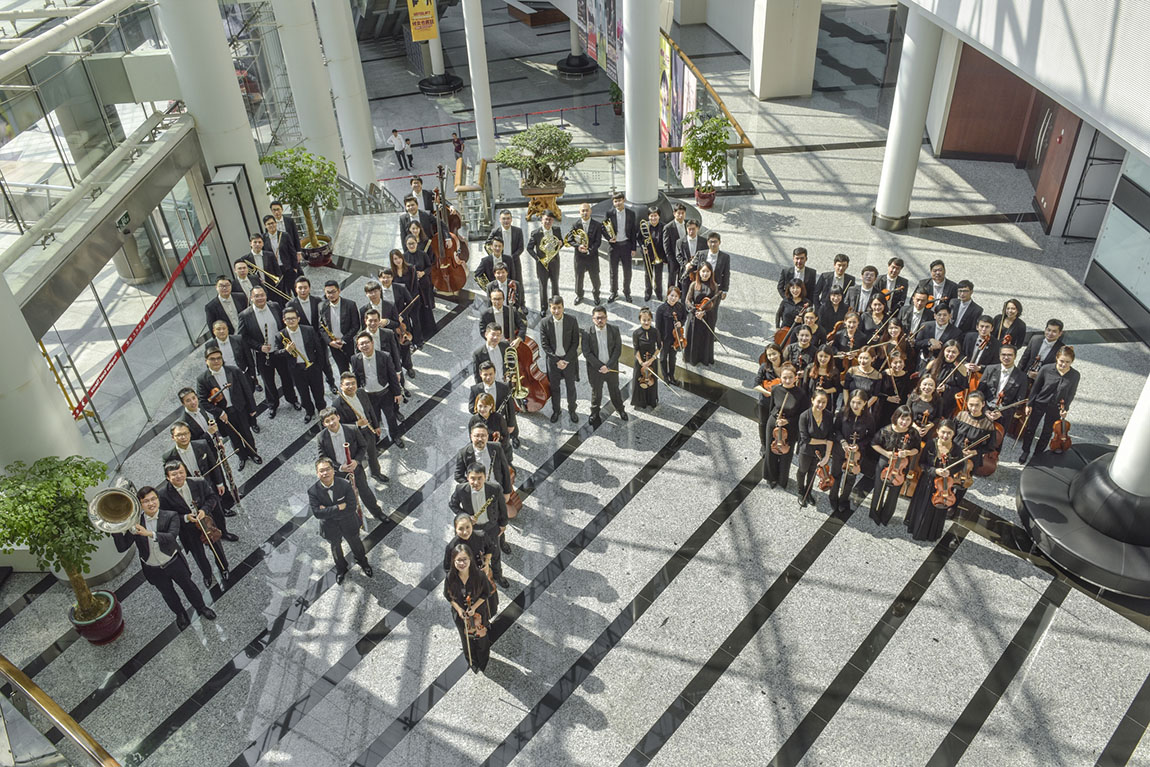
Introduction of HPO
Founded on April 20th 2009, Hangzhou Philharmonic Orchestra (HPO) has established itself as one of most promising and exciting symphony orchestras in China. The orchestra has ventured to perform across all disciplines of arts in concert, opera, ballet, chamber music, film music and recording to critical acclaim.
Yu Long, one of the most distinguished Chinese conductors, praised that HPO is the best stage for Hangzhou culture to the world, and as well as the exhibition platform of global cultures in Hangzhou.“Established only seven years ago in a city 180 miles from Shanghai, the HPO is by now one of the major orchestras in China”, reported by Musical America, 2016.
Under the leadership of Deng Jingshan, its President, the orchestra has engaged Yang Yang as Music Director and Chief Conductor. In April, 2015, Maestro Yu Long, the CPO Artistic Director, was appointed as the director of HPO Artistic Committee. Some of the foremost names have appeared as Artists-in-residence: violinist Ning Feng, cellist Qin Liwei, french horn player Han Xiaoming and pianist Kun-Woo Paik, Zhang Haochen and Yang Tianwa. Wang Jian is the Artist-in-residence currently.
An impressive array of renowned musicians in China and around the world has performed with HPO in the past years, including conductors Vladimir Fedoseyev, Paavo Järvi, Chung Myung-whun, Klaus Peter Flor, Gunther Herbig, Okko Kamu, Jesus Lopez-Cobos, Zubin Mehta, Krzysztof Penderecki, Gennady Rozhdestvensky, Chen Xieyang, Li Xincao, Jahja Ling, Shao-Chia Lv, Shui Lan, Tan Dun, Yu Feng, Yu Long, Zhang Guoyong, Zhang Yi, Zhang Xian, Tung-Chieh Chuang, pianists Barry Douglas, Jean-Yves Thibaudet, Andrei Gavrilov, Gary Graffman, Kun-Woo Paik, Jon Kimura Parker, Tamas Vasary, Chen Sa, Lang Lang, Zhang Haochen, violinists Sarah Chang, Midori, Ryu Goto, Daniel Hope, Gidon Kremer, Shlomo Mintz, Joseph Silverstein, Lara St. John, Maxim Vengerov, Renaud Capuçon, Daishin Kashimoto, Cho-Liang Lin, Lv Siqing, Ning Feng, Vera Tsu Wei Ling, cellists Gautier Capuçon, Alban Gerhardt, Natalia Gutman, Lynn Harrell, Li-wei Qin, Wang Jian, flutists Michael Martin Kofler, Massimo Mercelli, clarinetist Wenzel Fuchs, Manfred Preis, oboist Jonathan Kelly, Wang Liang, bassoonist Stefan Schweigert, french horn player Stefan Dohr, Han Xiaoming, Radovan Vlatkovic, trumpet player Gabor Tarkovi, Tamas Velenczei, trombone player Christhard Gossling, classical guitarist Yang Xuefei, Chinese folk musicians Min Huifen, Song Fei, Tang Junqiao, Zhang Hongyan as well as Sumi Jo, Thomas Hampson, He Hui, Huang Ying, Sun Xiuwei, Zhang Liping, Dai Yuqiang, Mo Hualun, Wei Song, Zhang Jianyi, Liao Changyong, Shen Yang, Yuan Chenye, etc.
All over the years HPO has presented a series of concerts and operas. Some of the highlights include China Grand Canal at Peking University and Rachmaninoff’s Second Symphony at the National Center for the Performing Arts in Beijing, ballet Marco Polo’s Last Mission during Shanghai Expo, La Bohème in concert version in Hangzhou, La Traviata in full stage co-produced with Maggio Musicale Fiorentino conducted by maestro Yu Long, Benjamin Britten’s Noye’s Fludde in Shanghai and the China premiere of Peter Grimes in Beijing. HPO has contributed Verdi’s Requiem and Mahler’s Second Symphony during the composers’ centennials. HPO has also performed Brahms’s Ein Deutsches Requiem with The Bach Choir. In October, 2014, HPO was invited to Wuhan to attend The Third China Opera Festival for concert edition La Traviata. In May, 2015, HPO was invited to attend 32nd Shanghai Spring International Music Festival for Exhibition and Performance of New Artists and Programs from Yangtze River delta, presenting HPO commissioned program, Seven Episodes of West Lake by Ye Xiaogang. On 31st December, 2015, HPO participated in CCTV “Music in the New Year, 2016 New Year Concert” as the first orchestra being invited to this program in China. In November, 2017, HPO was invited for the recording of the autumn concert of the “Four Seasons Theatre” at Hangzhou Grand Theatre Open Air Theatre with more than 400 people involved. The concert was broadcast on CCTV-15 and won great acclaim, improving the influence of HPO and the internationalisation of Hangzhou as an oriental cultural city.
In September, 2016, HPO had successfully participated in the Evening Gala "Enduring Memories of Hangzhou" for the G20 Leaders Summit. And this gala impressed leaders of Group 20 and directors of related world organizations as well as other guests. In September, 2017, HPO performed a symphony concert on the 3rd China-CEEC Cultural Cooperation Forum and won great acclaim from leaders and guests from China and 16 Middle East European countries.
2017 Hangzhou International Music Festival last from June to July, 2017 for 21 days, including six sections of concert performances, master classes, music lectures, outreach performances, China Symphony Summit and Clive Barda retrospective photographic exhibition. HPO organized the Music Festival and won critical acclaim from Phil Blech Vienna, Munich Philharmonic Chamber Orchestra, Wynton Marsalis and Jazz at Lincoln Center Orchestra and China National Opera House.
Aside from regular concerts, HPO has been engaged by major music competitions in China and drawn wide praise. Outside of China it has toured extensively to Slovenia, German, Italy, Russia and Estonia and performed at leading festivals including the prestigious Schleswig-Holstein Musik Festival and Beijing Music Festival. In Aug 2014, HPO was invited by Taormina Festival in Italy for cooperation in opera Pagliacci and Cavalleria Rusticana. In November, 2016, HPO toured to Czech, Italy, Austria and Germany.
HPO promotes contemporary music, especially programs from Chinese composers. HPO participated in debut of China Grand Canal and commissioned Tan Dun for Water Rock and Roll in Xihu Music International Music Festival which was supported by UNESCO. In 2012, Seven Episodes of West Lake composed by Ye Xiaogang debut in Hangzhou Grand Theater. In 2013, Dwelling in the Fuchun Mountains commissioned by HPO to Wen Tao debut in Zhejiang Great Hall of the People. In 2014, HPO commissioned Guo Wenjing for Man Jiang Hong, and debut in October, 2015 on The 18th Beijing Music Festival. In 2016, HPO commissioned Zhou Tian for Cello Concerto Flowing Sleeves.
Cultural exchange program being an integral part, the orchestra has partnered with Berliner Philharmoniker’s board, Philadelphia Orchestra and Yong Siew Toh Conservatory. Each year eight members of the orchestra will be recommended to work with Berliner Philharmoniker in Berlin in order to refine their musical taste. Besides, an education program has been initiated between HPO and Shanghai Conservatory of Music, HPO has become the Practical Training Base of Professional Degrees of Shanghai Conservatory of Music.In 2016, HPO was commissioned by Ministry of Commerce of P. R . China and CAEG for a three-month training project for Laos National Symphony Orchestra.
In October, 2014, HPO published its first recording with violinist Ning Feng by Universal Music and Channel Classics Records.
As a city orchestra, HPO is deeply rooted in the local community and has presented a series of audience outreach events as its priority. Reasonable ticket price, complimentary program book and free educational programs have earned HPO a large following. The residency at Hangzhou Grand Theater and nearly 50 subscription concerts have won it much respect and lots of love. Hangzhou Philharmonic Orchestra has made great artistic achievements by establishing musical seasons. With joint efforts of all members, HPO emphasizes on professional development with Hangzhou Speed and Hangzhou Model, and has been the golden name card and icon of Hangzhou in terms of cultural construction and international exchange. HPO is on the way towards becoming “top in China and renowned worldwide”.
Composers:
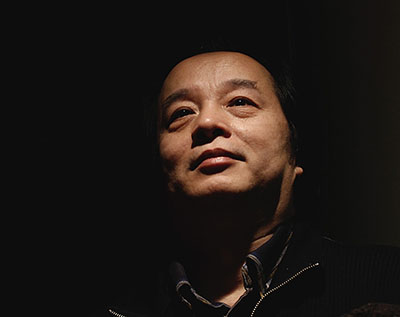
YE Guohui
YE Guohui is currently a composer, professor, doctor’s tutor and the Dean of the Composition Department of Shanghai Conservatory of Music. He was admitted to the Composition Department of Shanghai Conservatory of Music in 1986, and has been working at the SHCM as a faculty member since graduation. He pursued further education in 1999 at the Liszt Ferenc Academy of Music in Budapest, Hungary on a government sponsorship by China Scholarship Council.
As one of the most active composers in contemporary China, Mr. Ye Guohui has brought extensive and far-reaching influence and won high reputation in the music community with his many works frequently performed on many important occasions both in China and abroad. From Peking Opera Impression to Sunset in Yangguan, from Overlooking my Chinese Mainland to A Wine Cup Floating in a Winding Canal, all his woks are characterized by the employment of elements from traditional Chinese music culture, thus forming his distinctive personal style. His Listening to Jiangnan Again for violin and orchestra combines the music elements from Pingtan Opera with the symphonic music. And the composition Music from the Tang Court is created on the basis of his 30 years’ interests in and research on the ancient notation of the Tang Dynasty. This piece has been performed many times respectively by Shanghai Symphony, Shanghai Philharmonic Orchestra, Nice Symphony Orchestra (France), BBC Symphony Orchestra (UK), Czech National Symphony Orchestra, and etc. It becomes a typical example for the diversified interpretation and transmission of Chinese story in the global intercultural context. In 2007, his Late Autumn for Orchestra won the European Composer Award, the only Grand Prize for commissioned works at Young Euro Classic Festival in German. As the winner of this Prize, he was especially commissioned the Festival hymn Echo for Young Euro Classic 2008, which was performed by all the participating orchestras from all over the world, and was highly praised as the “fanfare from China” by European media.
His other major works include Prayers Come from the Jungles, To Mozart, A Cappella, Song at Dusk on a River and the Overture for Mei Lanfang. Besides, YE has won various awards and honors, including the title as one of the One Hundred Excellent Young Artists of China Federation of Literature, the Education Awards of Bao Steel, the 2nd prize (in cooperation) of the 5th National Teaching Achievements Awards for Higher Education, the Medal of Municipal Glory of Nice, France, a member of the four batches of culture talents program by the Propaganda Department of the Central Committee of the CPC, a State Council Expert for Special Allowance, a Distinguished Visiting Professor of the Chang Jiang Scholar Program, a Leading Scholar in Philosophy & Social Sciences of China (National support plan for high-level talents), and etc.
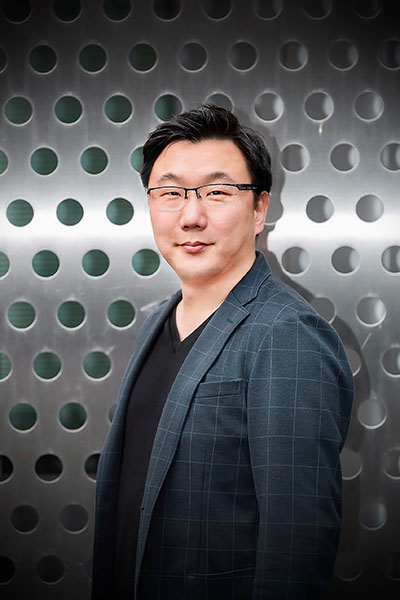
Hyunsuk Jun
Born in Seoul, Republic of Korea. Studied at ChuGye University for the Arts, Korea National University of Arts and Universitaet fuer Musik und Darstellende Kunst, Graz, Austria.His works have been performed at various countries such as USA, Germany, Italy, Belgium, Swiss, Austria, Poland and Japan. He was awarded to Austria in Styria 600 anniversary of the Congress commission and Music Promotion Prize of the City of Graz 2012 (Musik Foerderungspreis der Stadt Graz 2012). He won the 1st prize in International Composition Competition ITALY 150 and the 2nd prize in Karol Szymanowski International Composition Competition, also is the winner in International Composition Competition FRANCO EVANGELISTI 2013.His workpublished by Casa Ricordi and another workwas published by Suvini Zerboni. His recent workOrchestra was performed by Krakow symphony orchestra at Krakow(Poland).

Agata Zubel
composer and vocalist. Known for her unique vocal range and the use of techniques that challenge stereotypes, Zubel gives concerts throughout the world and has premiered numerous new works. Winner of several competitions, both as singer and composer. “Fryderyk” Award for Cascando – a CD programme of her own compositions, selected work (the grand prix) of the 60th UNESCO International Rostrum of Composers (2013), the “Badge of Merit to Polish Culture”.
As a singer and composer, Agata Zubel has collaborated with several dozen festivals and philharmonic companies, as well as the world’s leading ensembles, such as: Klangforum Wien, musikFabrik, London Sinfonietta, the Eighth Blackbird Ensemble, Seattle Chamber Players, and San Francisco Contemporary Music Players.
Her discography consists of more than a dozen titles, including albums dedicated to her own music – Not I (KAIROS) and Cascando (CD Accord), as well as her vocal interpretations of songs by Copland, Berg and Szymański (Poems), El-Derwid. Blots on the Sun and the most recent Dream Lake, respectively with song cycles by Witold Lutosławski and André Tchaikowsky (CD Accord).
Agata Zubel’s compositions have been commissioned by prestigious music institutions such as Los Angeles Philharmonic, Seattle Symphony, Hannoversche Gesellschaft für Neue Musik (for Staatsoper Hannover), Westdeutscher Rundfunk (for Neue Vocalsolisten), Ensemble InterContemporain, Ultraschall Festival in Berlin, the Deutsche Welle in Bonn, the Wratislavia Cantans Festival, and the Grand Theatre – National Opera in Warsaw
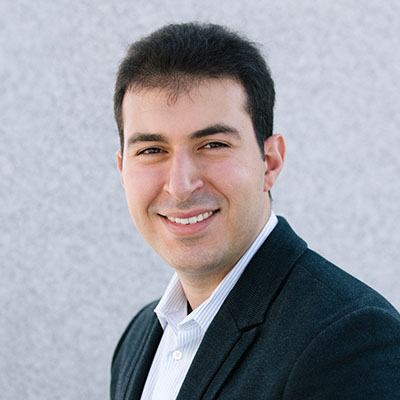
Saad Haddad
Saad Haddad (b. 1992) is a composer of orchestral, chamber, vocal, and electroacoustic music who achieves a “remarkable fusion of idioms” (New York Times), most notably in his work exploring the disparate qualities inherent in Western art music and Middle Eastern musical tradition. His music delves into that relationship by transferring the performance techniques of traditional Arab instruments to Western symphonic instruments, while extending their capabilities through the advancement of technology.
The 2017–18 season features the premiere of Haddad's first major string quartet, commissioned by the Lydian String Quartet, the premiere of Risala, co-commissioned by the Columbus and Princeton Symphony Orchestras, and a performance of Takht by the Minnesota Orchestra, among others.
Recent distinctions include the Charles Ives Fellowship from the American Academy of Arts and Letters, the Barlow Endowment General Commission, the S&R Foundation Washington Award Grand Prize, and the Jerome Fund for New Music grant from the American Composers Forum.
Born in Georgia and raised in California, Haddad holds degrees in composition from the Juilliard School and the University of Southern California, where his principal teachers included John Corigliano, Mari Kimura, Bruce Broughton, Frank Ticheli, Stephen Hartke, and Donald Crockett. His music is published exclusively by Dib Press.
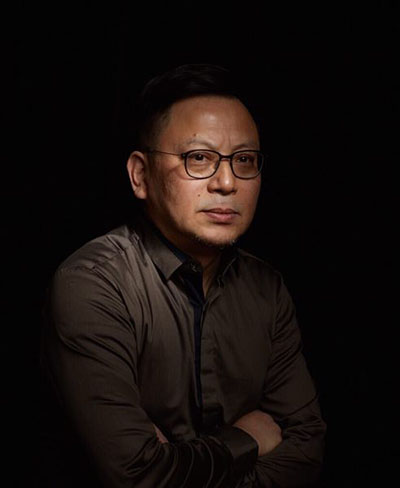
Guo Wenjing
Guo Wenjing, the Dean of The Composition Department and doctoral supervisor of the Central Conservatory of Music, has composed six operas, two ballets, three drama incidental musical works, eight concerti, six symphonies, three symphonic poems, two symphonic overture, two suites, one song cycle, four large-scale Chinese national orchestral works, three string quartets, and more than twenty chamber works, solo works, and choruses a cappella.
In 2011, Guo Wenjing was awarded the highest award for Chinese circle of literature and art, namely China ‘Yiwen Prize’.
Guo Wenjing has composed many music works for films directed by Zhang Yimou, Jiang Wen and other famous directors, as well as other more than 40 films and TV plays. In 2008, he created the unique music for the performance themed ‘Movable-Type Printing’ at Beijing Olympic Games Opening Ceremony on invitation. The premiere of his symphonic poem ‘Lotus’ was performed by Beijing Symphony Orchestra in London as the gift presented to 2012 London Olympic Games by Beijing Municipal Government, and this symphonic poem received high reputation.
The ballet ‘The Peony Pavilion’ created by Guo Wenjing for The National Ballet of China was performed respectively at the opening ceremony of Edinburgh International Festival in 2011, the New York Lincoln Center in 2015 and then had The United States tour, and in 2016, this ballet was arranged to have the Europe tour again.
In 2015, the opera ‘Rickshaw Boy’ created by Guo Wenjing for the National Centre for the Performing Arts had the tour in Italy, the hometown of opera, and this tour achieved success and became the first Chinese opera in the history of Europe tour.
Conducter:
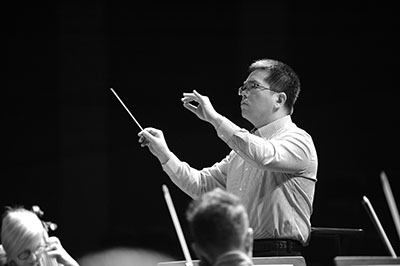
Yang Yang
Yang Yang, born in a musical family, learned piano with Prof. Li Qifang. Later, he learned conducting respectively with Prof. Xu Xin and Prof. Wu Lingfen, and then was admitted to the Conducting Department of Central Conservatory of Music, being one of the students of Prof. Yu Feng.
In November 2006, Yang won the first place for his outstanding performance at the Dimitris Mitropoulos International Competition for Orchestral Conducting in Greece. It’s the first time for the Chinese conductors to have such honor.
As one of the most active young conductors in China, Yang has maintained close partnership with all mainstream orchestras and opera houses domestically. Meanwhile, he has successfully left tracks at a host of foreign orchestras such as Deutsches Symphonie-Orchester Berlin, German Philharmonic Orchestra of Cologne, Stuttgarter Philharmoniker, National Rhine Philharmonic Orchestra, New Brandenburg Philharmonic Orchestra, Italian Verona Opera House, Teatro Regio Torino, Italian Rome Philharmonic Orchestra, French Cannes Symphony Orchestra, Bordeaux Symphony Orchestra, Valencia Orchestra of Spain, Greek Symphony Orchestra, Athenian Chamber Orchestra and Korean Incheon Philharmonic, etc. He had sincere cooperation with world famous musicians such as cellist Lynn Harrell, Alban Gerhard, Wang Jian, Natalia Gutman, violinist Maxim Vengerov, Gidon Kremer, Midori, Sarah Chang, Augustin Dumay, Lenard Karpison, Cho-Liang Lin, pianist Gary Graffman, Lang Lang, Barry Douglas, Jean-Yves Thibaudet, Kun-Woo Paik, Jon Kimura Parker, soprano Sumi Jo, clarinetist Sabine Meyer, Wenzel Fuchs, French horn player Radovan Vlatkovic, Stefan Dohr, etc.
Recommended by maestro Yu Long,Yang started his conducting career in the year of 1998, at the First Beijing International Music Festival (BMF). Since then, he conducted operas and concerts at BMF eight years consecutively. From 2000 to 2016, Yang Yang held the position as the Assistant Conductor and Resident Conductor of China Philharmonic Orchestra (CPO). In 2006, Yang Yang attended an advanced training course hosted by maestro Myung-whun Chung in Korea. In 2009, he has presided over the founding of Hangzhou Philharmonic Orchestra (HPO).
Since 2009, Yang Yang and HPO had successfully completed eight music seasons, and performed at leading festivals including Mecklenburg-Vorpommern Festival, Schleswig-Holstein Musik Festival, Ravello Festival, Emilia Romagna Festival, Taormina Festival, Ljubljana Festival. He also toured with HPO extensively in Russia and Estonia winning great applause and high critical acclaim at home and abroad.
With a wealth of experience, Yang is undoubtedly one of today’s most outstanding conductors in China. In recent years, he has broadly dabbled in opera conducting and successfully demonstrated many of the great operas, such as Turandot, Madama Butterfly, La Boheme by G. Puccini, La Traviata, Rigoletto by G. Verdi, Cavalleria Rusticana by Pietro Mascagni, Pagliacci by Ruggero Leoncavallo, Carmen by Bizet, Die Zauberflöte by Wolfgang Amadeus Mozart, Night Banquet and Wolf Cub Village by Guo Wenjing, etc, which drew broad attention internationally and showed his outstanding talents in opera conducting.
Yang Yang is now acting as Music Director and Chief Conductor of China National Opera House, Artistic Director and Chief Conductor of Hangzhou Philharmonic Orchestra.
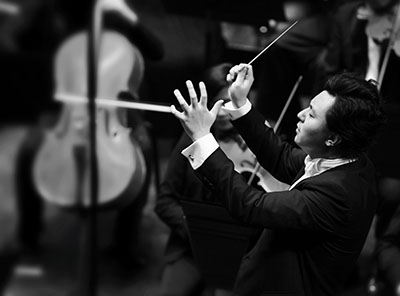
Hong Yin
Hong Yin, came from a musical family. He began to study piano performance and music theory with Mr.Gao Yansheng from Tian Jin Conservatory of Music.
After graduating from high school, Yin studied with excellent academic and subject-specific performances at the Central Conservatory of Music, majoring in orchestral conducting at Conducting Department. Yin studied with Yang Yang, Resident Conductor of China Philharmonic Orchestra and Artistic Director and Principal Conductor of Hangzhou Philharmonic Orchestra. In 2013, Yin graduated with outstanding professional achievements and was appointed as the Assistant Conductor by Hangzhou Philharmonic Orchestra.
In recent years, Yin has actively involved in concerts preparations and rehearsals of many domestic symphony orchestras and student orchestras. At the same time, Yin was dedicated to symphony promoting, he and HPO have organized a variety of activities such as Public Concert Series and campus concerts. Yin’s performance received plaudits by not only local audiences but also teachers and students in colleges. In 2012, Yin conducted the Flute Section of The Fifth Beijing International Music Competition, which was co-hosted by China International Culture Association and Beijing International Culture Association. His excellent performance won highly praise from the judges and contestants. In 2013 and 2014, Yin has collaborated with the master of humor teller, Dan Kamin and held two concerts, The Clown and The Lost Elephant for the Children’s Day, perfectly combined stage performance and music. In 2013 and 2014, Yin has also been appointed as the Music Director of China International Cartoon Festival Opening Ceremony held by SARFT and People’s Government of Zhejiang Province. In July 2014, Yin was appointed as the judge of western music group for The Ninth Music and Dance Competition held by Cultural Affairs of Zhejiang Province.
As a young conductor, Yin has not only accumulated a wide range of repertoires, his conducting style has also well represented the unique music processing and understanding of the new generation.
Performers:
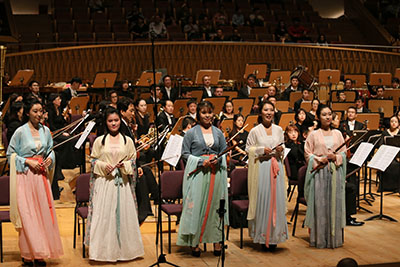
Music from the Tang Court
In A.D. 964, the last emperor of Southern Tang Kingdom Li Yu was dissatisfied with one of his officials Han Xizai who indulged in nightlife everyday, but he didn’t want to express his anger directly. Instead, the emperor sent a court painter to the house of Han Xizai, and ordered him to depict what he really saw. After the painted scroll Night Revels of Han Xizai was finished, the emperor presented it to Han Xizai as a gift, and Han Xizai felt very ashamed when seeing the painting. The action of the emperor Li Yu was well-intentioned, hoping Han Xizai to correct his own behavior( The story is documented in Supplement to the History of the Five Dynasties 'Wudai Shi Bu', written by Tao Yue in 1012 in Northern Song Dynasty).
Night Revels of Han Xizai is split into five distinct sections: Listening to pipa, watching dancers, taking rest, playing the wind instruments, and seeing guests off. The painting lively narrates the scenes of life in China over one thousand years ago. As far as the section “playing the wind instruments” is concerned, what are these five women musicians playing?
Music of the Tang Court was lost to China, but it was spread to Japan at that time and transposed into score handed out. Today we will perform The Wine-Puppet from the music of the Tang Court.
The Wine-Puppet is from four different sources, which are Ko-fu/Hosho-fu ryokan (KF/HSFRK, 1201), Shinsen Sho-teki-fu (SSSTF, 1303), Jinchi-yoroku (JCYR, c.1171) and Sango-yoroku (SGYR, c.1171) .
English musicology, Laurence Picken compared this four versions, and research. He found the result very similar.
In 2013, China composer Ye Guohui found Japanese Gagaku in the internet, and ten more performance of The Wine-Puppet. After having compared the above and Laurence Picken’s research, Ye considered they highly shared the same origin! And it came to a conclusion which showed that music of Tang Court hasn’t lost to world!
Ye highlights that the most important point is, it is proved that The Wine-Puppet which remained possesses characteristic of music of the Tang Court according to the word in theory and video in practical. In other words, The Wine-Puppet we heard today here owns the feature of the Tang Court a thousand years ago! From the inheritance and research of classics to actually existing of Japanese Gagaku, it was over a thousand year. It is rare living fossil of the Tang culture and human civilization.
We will perform The Wine-Puppet, and imitate the scene of playing the wind instruments from Night Revels of Han Xizai. We hope that Chinese Tang music and painting arts can be presented vividly by both hearing and vision.

Yuhe LI
Yuhe LI is recognized as one of the youngest Chinese musicians on the international stage today, praised as "an truly brilliant Artist" by the Global Times, performing internationally in Europe, Asia and North America. She has performed at lots of famous Concerthall, such as Wiener Musikverein, Beijing Concert hall, Toronto Center of the Arts, Théâtre Pierre Cardin in Paris, Salle Cortot in Paris, Theatre modern Takatsuki in Japan.. and has been invited to perform at renown festivals.
As a native of Beijing, Yuhe made her first public appearance at the age of nine at Beijing Concerthall. At age of 15, she entered the middle school attached to Conservatory of China under class of Yuan Fang. Three years later she was awarded the Fu-Ji Scholarship to study with Devy Erlih at Conservatory of Paris. In 2012, she won the first prize in the highest level of the France "les Clés d'Or" violin competition in January, and in June she obtained the High Diploma of Performing with first prize, then she won the third prize of Osaka International Music Competition in October. In 2014, she entries University of Art Berlin on master solo degree under class of Prof.Bernhard Hartog. In April she got the diploma of Concertiste (Artist) of Conservatory of Paris with the prize that all the jury agreed with unanimous approval. In 2015, she won the first prize and gala prize of Léopold Bellan international violin competition. In 2016, she won the 2nd prize of London Virtuoso grand prize international violin competition.In 2017 she has become the teacher of violin and chamber music at conservatory of China.
As a brilliant soloist, Yuhe LI has performed with famous orchestra, such as Toronto Festival Symphony Orchestra, Hamburg new Philharmoniker, Beijing Chamber Orchestra, Jakarta national Symphony Orchestra under the direction of Maestro Ulrich Windfuhr, Jing Huan, Jean Claude Casadesus and so on. She has also performed as guest Principal Concert Master in Bavarian Group Orchestra. Yuhe Li has recorded several album, such as “Harmonic”, “Caprice Valse” and so on. Since 2016, she did a concert tour in NCPA China,Beijing concert hall, Tianjin Grand Theater, Haerbin Grand Theater, and also did lots of master class in Peking University, Qinghua University, Renmin University… Since 2017, Yuhe LI has become a violin teacher at Conservatory of China. Now she plays a Gennaro Gagliano in year of 1760 and the bow from James Tubbs of year 1890.
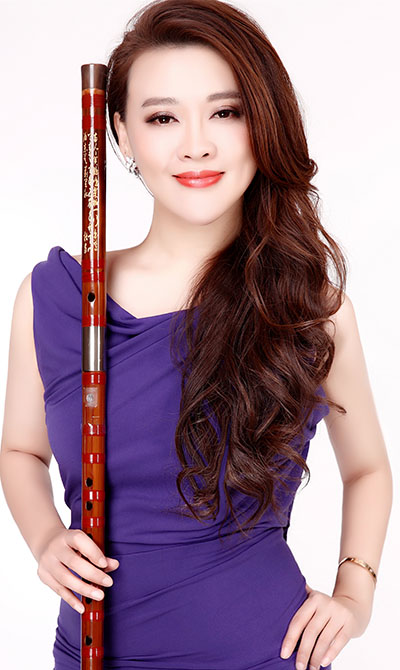
Tang Junqiao
Renowned player and educator of bamboo flute
Professor and tutor of graduate students at Shanghai Conservatory of Music
A leading talent of Shanghai
President of the Bamboo Flute Professional Committee of Shanghai Musician Association
Vice President of China Bamboo Flute Academy
Vice President of the Bamboo Flute Academy of Chinese Musicians Association
Member of the Review Committee of China National Arts Fund
Expert dissertation reviewer at the Center of Academic Degrees of the Ministry of Education
Washington Post once praised Tang Junqiao for “her virtuosity in a nearly unlimited breadth of timbres...” She has also won accolades from bamboo flute professionals for her solid skills, mellow timbre and superb control of breadth.
As a guest solo flutist, she has been invited to perform at dozens of international music and art festivals, as well as hundreds of concerto and special concerts.
She has performed traditional Chinese music for more than 30 foreign state leaders, and is the only Chinese player of folk music who has ever been invited to regularly cooperate with world famous institutes like New York Philharmonic, BBC Symphony Orchestra, London Symphony Orchestra and Bamberg Symphony in the performance of a number of concertos for Chinese bamboo flutes. Quite a few bamboo flute music pieces have become classics after her performance.
She also stands out as an excellent educator. More than 10 of her students majoring in bamboo flute at Shanghai Conservatory of Music have won 29 golden awards at national professional competitions of traditional instrumental music. Together, Tang and these talented students are known as “China’s Dream Team of Bamboo Flutists.”
She has published dozens of teaching materials and performance collections. The “Magical Flute of China – Portrait of Dizi Master Tang Junqiao” is the first SACD bamboo flute performance collection in the world, released by a Dutch record company in 48 countries.
She is now a contract soloist with China Philharmonic Orchestra, Beijing Symphony Orchestra, Shanghai Symphony Orchestra, Guangzhou Symphony Orchestra and Hangzhou Philharmonic Orchestra.
Program Notes:
YE Guohui Music from the Tang Court for 3 bili, 2 bamboo flutes and Orchestra (2013)
Music from the Tang Court by Guohui YE was commissioned by the Organizing Committee of the 42nd Annual Conference of UNESCO’s International Council for Traditional Music (ICTM) in 2013, and it was premiered in Shanghai the same year. The material used in the music originated from the Wine Puppet that dated back to Tang Court (618-907). The Wine Puppet has been researched and verified by composers and proved that the music from Tang Court was not lost. In YE’s music, the Wine Puppet was presented in various forms. From its premiere, Music from the Tang Court was performed in different versions both at home and abroad.
Hyunsuk Jun (Korea) Vistara for Orchestra (2011/2013)
A few years ago, an American astronomer discovered a curious wave in space. He converted the wave so that people could hear it, and as a result of a change in the wave after the Big Bang from 40 million years to 100 million years ago, a major third changed to a minor third. I get my musical inspiration for some of my works from this research. In this work, there are two characteristics of the sound movement. Firstly, the expansion of a periodic wave and an aperiodic wave. Secondly, the emergence of the sound by the development of the wave. Vistara is a Sanskrit word meaning expansion.
Agata Zubel (Poland) Violin Concerto for violin and chamber orchestra (2014)
In the Violin Concerto, the soloist is supposed to shimmer in a kaleidoscope of the MANY functions implied by this role. The soloist does not have a monopoly on the audience’s attention, nor is the soloist the one for whom everyone else is supposed to just build up a musical background on the principle of an accompaniment. The key role assigned to the soloist is worked out not in opposition to the rest of the instrumentalists, but rather by entering into the role of a titanic protagonist-leader. The soloist does not dominate the rest on account of the place occupied on the stage, nor does the soloist fight with them as one against all. After all, the soloist stands IN FRONT OF the orchestra, but not hierarchically OVER it. On the other hand, the soloist is a virtuoso and is comfortable with his or her strong personality.
Saad Haddad (U.S.A.) Takht for full orchestra (2016)
The title of this work, Takht (‘ensemble’ in Arabic), describes the typical Middle Eastern musical group that consists of most of the traditional instruments used in Arabic music, including the oud, qanun, kamanjah, ney, riqq, and darbakeh. Originally composed for a chamber orchestra of 15 players (one per part), this work reflects a symphonic expansion of the Western equivalent of that ensemble. Some of the instruments even share similarities between each other; for example, the 'ney' is similar to the flute in construction, while the 'kamanjah' sounds very much like the violin. An ongoing muse in my output thus far is the voice of arguably the most famous Egyptian singer who ever lived, Umm Kulthum (1898–1975), the “Star of the East.” In this particular work, her voice, in a sense, is brought back to life as the woodwinds, brass, and harp instrumentalists literally sing and play into their instruments, transforming the hall into an abstract depiction of Umm Kulthum’s permeating presence in the lives of millions of people that continue to adore her today.
Guo Wenjing (China)
WILD FIRE, Bamboo flute Concerto No.2(2010)
—for bamboo flute and orchestra
1) Allegro feroce
2) Lento moderato lento
3) Presto
In this work, I continue my efforts to expand upon the sound and character of traditional Chinese instruments, while also doing my best to move away from their folkloric roots.
In composing this concerto, I purposefully avoided the gently undulating, crisp and clear sound of the bamboo flute that is so commonly associated with this tradional Chinese instrument. Instead, I allowed the bamboo flute to express a range of emotions from burning anger to trembling despair, thereby giving its sound a contemporary edge.
Wild Fire is light illuminating a black sky. I see it as a symbol of truth that has the power to cleanse impurities and drive out evil.
Tickets sale Tel:010-66425899 Ms.Xu 66425727 Ms.Liu
